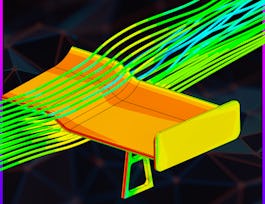Course 3 of Statistical Thermodynamics, Ideal Gases, explores the behavior of systems when intermolecular forces are not important. This done by evaluating the appropriate partition functions for translational, rotational, vibrational and/or electronic motion. We start with pure ideal gases including monatomic, diatomic and polyatomic species. We then discuss both non-reacting and reacting ideal gas mixtures as both have many industrial applications. Computational methods for calculating equilibrium properties are introduced. We also discuss practical sources of ideal gas properties. Interestingly, in addition to normal low density gases, photons and electrons in metals can be described as though they are ideal gases and so we discuss them.

Offrez à votre carrière le cadeau de Coursera Plus avec $160 de réduction, facturé annuellement. Économisez aujourd’hui.


Ideal Gases
Ce cours fait partie de Spécialisation Statistical Thermodynamics

Instructeur : John W. Daily
6 428 déjà inscrits
Inclus avec 
(141 avis)
Ce que vous apprendrez
Analyze the behavior of monatomic, diatomic, and polyatomic ideal gases under various conditions
Describe the distinction between pure ideal gases and ideal gas mixtures and their industrial applications
Identify the key components of the partition functions used to describe translational, rotational, vibrational, and electronic motion
Compétences que vous acquerrez
- Catégorie : Mechanical Engineering
- Catégorie : Chemistry
- Catégorie : Thermodynamics
- Catégorie : Gases
Détails à connaître

Ajouter à votre profil LinkedIn
5 devoirs
Découvrez comment les employés des entreprises prestigieuses maîtrisent des compétences recherchées

Élaborez votre expertise du sujet
- Apprenez de nouveaux concepts auprès d'experts du secteur
- Acquérez une compréhension de base d'un sujet ou d'un outil
- Développez des compétences professionnelles avec des projets pratiques
- Obtenez un certificat professionnel partageable


Obtenez un certificat professionnel
Ajoutez cette qualification à votre profil LinkedIn ou à votre CV
Partagez-le sur les réseaux sociaux et dans votre évaluation de performance

Il y a 3 modules dans ce cours
Module 1 starts an exploration of systems for which intermolecular forces are not important. This is done by evaluating the appropriate partition functions for translational, rotational, vibrational and/or electronic motion. In this module we explore pure ideal gases including monatomic, diatomic and polyatomic species. We also explore literature sources of properties and empirical estimation methods.
Inclus
5 vidéos5 lectures4 devoirs3 sujets de discussion
In Module 2 we discuss both non-reacting and reacting ideal gas mixtures as both have many industrial applications. Computational methods for calculating equilibrium properties are introduced.
Inclus
3 vidéos3 lectures3 sujets de discussion
Interestingly, in addition to normal low density gases, photons and electrons in metals can be described as though they are ideal gases and so we discuss them.
Inclus
2 vidéos2 lectures1 devoir1 sujet de discussion
Instructeur

Offert par
Recommandé si vous êtes intéressé(e) par Mechanical Engineering

Coursera Project Network

The World Bank Group

The University of Edinburgh

HubSpot Academy
Pour quelles raisons les étudiants sur Coursera nous choisissent-ils pour leur carrière ?




Avis des étudiants
Affichage de 3 sur 141
141 avis
- 5 stars
68,08 %
- 4 stars
24,11 %
- 3 stars
3,54 %
- 2 stars
0,70 %
- 1 star
3,54 %

Ouvrez de nouvelles portes avec Coursera Plus
Accès illimité à plus de 7 000 cours de renommée internationale, à des projets pratiques et à des programmes de certificats reconnus sur le marché du travail, tous inclus dans votre abonnement
Faites progresser votre carrière avec un diplôme en ligne
Obtenez un diplôme auprès d’universités de renommée mondiale - 100 % en ligne
Rejoignez plus de 3 400 entreprises mondiales qui ont choisi Coursera pour les affaires
Améliorez les compétences de vos employés pour exceller dans l’économie numérique
Foire Aux Questions
Access to lectures and assignments depends on your type of enrollment. If you take a course in audit mode, you will be able to see most course materials for free. To access graded assignments and to earn a Certificate, you will need to purchase the Certificate experience, during or after your audit. If you don't see the audit option:
The course may not offer an audit option. You can try a Free Trial instead, or apply for Financial Aid.
The course may offer 'Full Course, No Certificate' instead. This option lets you see all course materials, submit required assessments, and get a final grade. This also means that you will not be able to purchase a Certificate experience.
When you enroll in the course, you get access to all of the courses in the Specialization, and you earn a certificate when you complete the work. Your electronic Certificate will be added to your Accomplishments page - from there, you can print your Certificate or add it to your LinkedIn profile. If you only want to read and view the course content, you can audit the course for free.
If you subscribed, you get a 7-day free trial during which you can cancel at no penalty. After that, we don’t give refunds, but you can cancel your subscription at any time. See our full refund policy.

